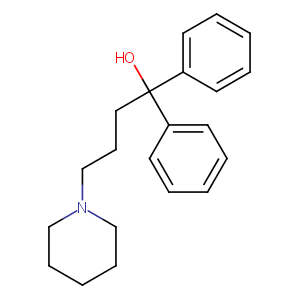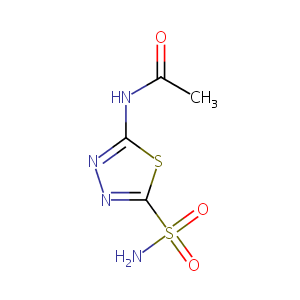| 1 |
Recurrent recessive mutation in deoxyguanosine kinase causes idiopathic noncirrhotic portal hypertension.Hepatology. 2016 Jun;63(6):1977-86. doi: 10.1002/hep.28499. Epub 2016 Mar 31.
|
| 2 |
URL: http://www.guidetopharmacology.org Nucleic Acids Res. 2015 Oct 12. pii: gkv1037. The IUPHAR/BPS Guide to PHARMACOLOGY in 2016: towards curated quantitative interactions between 1300 protein targets and 6000 ligands. (Ligand id: 7163).
|
| 3 |
Acetazolamide FDA Label
|
| 4 |
URL: http://www.guidetopharmacology.org Nucleic Acids Res. 2015 Oct 12. pii: gkv1037. The IUPHAR/BPS Guide to PHARMACOLOGY in 2016: towards curated quantitative interactions between 1300 protein targets and 6000 ligands. (Ligand id: 6792).
|
| 5 |
Diphenidol-related diamines as novel muscarinic M4 receptor antagonists. Bioorg Med Chem Lett. 2008 May 1;18(9):2972-6.
|
| 6 |
Tamm-Horsfall protein accumulation in glomeruli during acetazolamide-induced acute renal failure. Am J Nephrol. 1989;9(1):56-7. doi: 10.1159/000167936.
|
| 7 |
Drugs@FDA. U.S. Food and Drug Administration. U.S. Department of Health & Human Services.
|
| 8 |
Targeting hypoxic tumor cell viability with carbohydrate-based carbonic anhydrase IX and XII inhibitors. J Med Chem. 2011 Oct 13;54(19):6905-18.
|
| 9 |
Indomethacin activates carbonic anhydrase and antagonizes the effect of the specific carbonic anhydrase inhibitor acetazolamide, by a direct mechanism of action. Int J Clin Pharmacol Ther. 2001 Jun;39(6):265-70.
|
| 10 |
[Effect of inhibiting aquaporin-1 on proliferation and apoptosis of the Hep-2 cell]. Lin Chuang Er Bi Yan Hou Ke Za Zhi. 2006 Nov;20(21):988-91.
|
| 11 |
Systems pharmacological analysis of drugs inducing stevens-johnson syndrome and toxic epidermal necrolysis. Chem Res Toxicol. 2015 May 18;28(5):927-34. doi: 10.1021/tx5005248. Epub 2015 Apr 3.
|
| 12 |
ADReCS-Target: target profiles for aiding drug safety research and application. Nucleic Acids Res. 2018 Jan 4;46(D1):D911-D917. doi: 10.1093/nar/gkx899.
|
|
|
|
|
|
|


